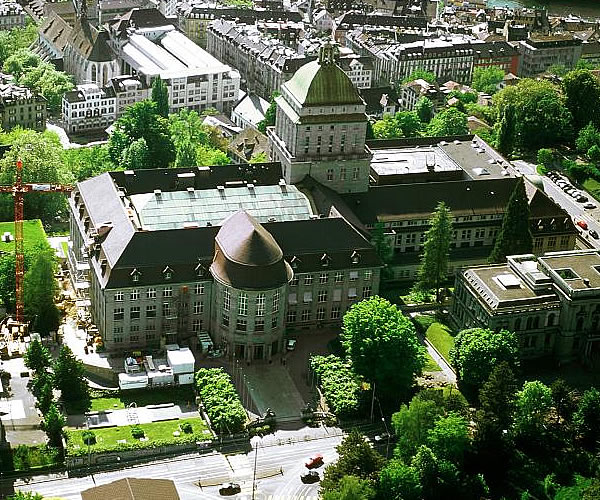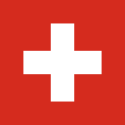
Languages in Switzerland
There are four national languages in Switzerland: German, French, Italian and Romansh. All four languages have equal rights, but in practice the use of Romansh is fairly isolated. German, French and Italian enjoy equal status in Parliament, the federal administration and the army. The official language used by the government and in most publications is German, while the main spoken language is Zurich German (Swiss German Züritüütsch), which is a dialect of Alemannic. English and French are also widely spoken and often used in official publications and announcements alongside German.
The population is made up of: (Swiss-)German 63.9 percent, French 19.5 percent, Italian 6.6 percent, Romansh 0.5 percent and others 9.5 percent. Cantonal school regulations require that every child learn a second national language starting in primary school. English is increasingly taught at an early age, sometimes taking priority over a second national language. People who move to the country may need to learn one or more local languages depending on where they settle. Berne, Fribourg and Valais are officially bilingual.
Swiss German
Swiss German, or Züritüütsch (in Swiss German) or Schwytzerduetsch (High German) or Suisse-Allemand (French), is the language spoken in the German-speaking areas. It is actually not a single language but a wide variety of local accents and dialects. It sounds quite different from the German spoken outside of Switzerland. Dialects are so varied and different,even some Swiss have problems communicating with people from other regions. German Hochdeutsch ("high German") is taught in school and people will often revert to this when speaking with German-speaking foreigners. This is also the language used in written communication as there is not an official national grammar, or even an agreed upon spelling for "Schwytzerduetsch".
Swiss French
French is spoken in the cantons of Geneva, Jura, Neuchatel and Vaud, as well as in parts of the cantons of Bern, Fribourg and Valais. The French-speaking area of Switzerland is called Romandie. There are different dialects especially in rural districts, but communication between areas is less problematic than Swiss German. There is also a greater similarity between French spoken in western Switzerland and the French spoken in France.
Swiss Italian
Italian is spoken in the southern valleys up to the St. Gotthard, Lukmanier, San Bernardino, Maloja, and Bernina passes. This region comprises the whole of the canton of Ticino and the valleys of Misox/Calanca, Bergell/Bregaglia and Poschiavo in the canton of Graubuenden (Grisons). It is mostly spoken with a Lombardy accent.
The Romansh-speaking Region
Originally conquered by the Romans, this area was latinised by the original inhabitants. Being isolated by the numerous valleys, there were five distinguishable idioms besides Italian in three southern valleys. The language has been declared an official language, but it continues to erode. There have been efforts to create a single written language known as Rumantsch Grischun and maintain the language.
Schools
With the plethora of languages used in the country, there are many language schools. There are language schools (Sprachschule or academie de langues)or German language courses at Volkshochschulen or universites populaires). There are full-time and part-time courses, as well as residential courses (where they offer accommodation). Most offer sample lessons or let you sit-in for free before signing up. Shop around before choosing.
- Price
- Current knowledge of the language
- Time you have available
- How fast you want to learn
- Migros Klubschule - offers language courses in almost every language for fair prices.
- LSI Language School Zurich - Ideally located in the city, the school focuses on foreign language. Language courses are paired with extensive social activities program.
- University of Zurich - One of the universities that offers great courses in foreign language
- Bellingua Language School - Bellingua is the leading language school in Zurich, specializing in German as a foreign language.
- Berlitz - Large international school for adults and kids with professional preparation courses for a number of internationally recognized external examinations.
- Lycee Francais de Zurich - International French school that has branches around the world.
Private Lessons
Private lessons are another option. More expensive than language courses, these can be very effective. Expect to pay between 10-20 euro per hour depending on the tutor's qualifications and experience.
You can search for opportunities in a local newspapers, on message boards at pubs, copy centers, supermarkets, universities, and cafes, or on online boards such as EasyExpat's classifieds or Job Listings for tutors and classes. You can also find friends on the forum to work on language exchange.
Language Exchange
An exchange partner (Sprachaustausch, Tandem, echange de langues) is an excellent resource for practicing a new language with a native speaker. As an added bonus, language exchange partners can help you understand the culture of the area and inform you of local happenings. Questions about gift giving, festivals, nightlife, and greetings can be addressed without worry. In the best case sceneries, an exchange partner is not only your ambassador, but a friend.
Check in expat forums to find partners.
Update 18/08/2011

Babbel is an international success with millions of active subscribers and ranked as the world's #1 innovative company in education.
Why Babbel?
Learn and review on your own schedule: Mobile, tablet or desktop compatible, with lessons about 10-15 min.
Expert-made courses: Learn the basics or focus on topics like travel, culture, or business.
Start speaking right away: Learn to speak a new language naturally and conversationally.
Every learner is different: Each course is based on your native language and personal interests.
Remember everything: Babbel employs proven cognitive techniques that move new vocab to your long-term memory.
Refine your pronunciation: Practise speaking and improve your pronunciation with speech recognition technology.
Try Babbel for free today
Registration with Babbel is completely free of charge and the first lesson in every course is FREE to try (Depending on the language you choose, that's 30-80 free lessons!).
If you want full access to Babbel's courses, simply choose a subscription that works best for you. Buy with confidence: 20-day money back guarantee!
